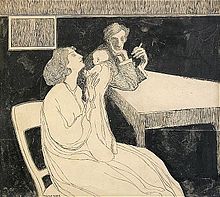Family
A family is a group of people who, in most cases, live together. They share their money and food and are supposed to take care of one another. Its members are either genetically related (like brother and sister) or legally bound to each other, for example by marriage. In many cultures, the members of a family have the same or a similar surname.

The family in accordance to the Catholic doctrine is treated in many articles of the Catechism of the Catholic Church starting from the article 2201. [1]
A family is said to be society's smallest unit, its nucleus. Family life is more private and intimate than public life. But in most countries there are laws for it. For example, there are restrictions for marrying within the family and bans for having a sexual relationship with relatives, especially with children.
Types of families
changeThree types of family on the basic of size
are: nuclear family, single-parent family and extended family.
- A nuclear family is made up of parents and one or more children living together.
- A single-parent family is one where there is one parent and one or more children.
- An extended family or joint families means father, mother, daughters, sons, grandparents, uncles, aunts, cousins, nieces and nephews. In many countries including China, Pakistan and India, extended or joint families traditionally live together.
Both the "nuclear family" and the "single-parent family" are also called the "immediate family".
Foster families are families where a child lives with and is cared for by people who are not his or her biological parents.